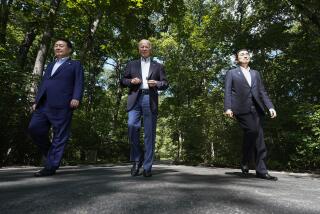Bush/Miyazawa Meeting Is ‘Staged’ for Success : Summit: Real problems won’t be resolved as the two leaders aim to preserve status quo.
- Share via
TOKYO — President Bush’s summit meeting next week with Japanese Prime Minister Kiichi Miyazawa promises to be a personal triumph for the two leaders but a major disappointment for Americans seeking a resolution to our economic problems with Japan.
This results from a curious but little-noticed relationship that has developed in recent years between our two heads of state: Each holds the key to the other’s political future.
For President Bush, the ostensible purpose of his visit is to extract Japanese trade concessions in order to deflect domestic criticism for focusing on foreign policy at the expense of the economy. Inviting 21 top business executives to accompany him is meant to demonstrate his support for U.S. industry, which has suffered from a decade of Administration neglect.
For Miyazawa, the aim is to secure enough presidential commitments on collaborative activities to enhance his image of promoting a U.S.-Japan global partnership. With a weak domestic base, the prime minister desperately needs to demonstrate his ability to deal with foreign countries, especially the United States, if he is to remain in office for long.
Each government’s most persuasive logic has less to do with solving substantive economic problems than with ensuring a continuation of the political status quo.
U.S. officials will present the following argument to their Japanese counterparts: The President, a friend of Japan, faces hostile pressures at home from Congress, Democratic and Republican presidential candidates and the private sector. To overcome these pressures and to emerge victorious in next November’s election, the President must be seen as forcing Japan to accept significant trade concessions. For this, Bush needs Miyazawa’s help.
Japan will be receptive to such arguments because they dovetail with the widely held Japanese view of Democrats as protectionists and Republicans as free-traders. This idea took root in Japan during the 1984 presidential election when Walter Mondale was painted as a protectionist tool of American labor interests, whereas Ronald Reagan was depicted as a benign preserver of free trade. The 1988 presidential election reinforced this dichotomous view of American politics.
Japanese officials will make the following case to their American counterparts: Miyazawa is an “internationalist” but lacks a domestic power base. Precisely because foreign affairs is his strong suit, if he is seen to falter in dealing with the President, his political future would be in jeopardy. The prime minister needs Bush’s help to elevate him to the stature of world statesman, thereby boosting his domestic standing.
White House officials will be receptive to this argument because they perceive Miyazawa as more friendly to U.S. interests than other contenders for Japan’s leadership. The United States will also respond to Japan’s desire to highlight the notion of a global partnership, especially if this implies Japanese financial contributions to military security, foreign aid, or science and technology collaboration.
Thus, the stage is set for a “successful” visit. The summit meeting must, by definition, be a success, since it is imperative for both heads of state--for domestic political reasons--to achieve their objectives.
For the President, these objectives are largely rhetorical: commitments, rather than actions, to open the Japanese market or limit exports to the United States. For the prime minister, they are broadly aimed at preserving the status quo: cooperation and collaboration to ensure continued U.S. military protection and a relatively open U.S. market for Japanese exports and investment.
The joint communique is certain to contain elements that can be pointed to by each side as “achievements.” Whether these achievements--meant to bolster each leader’s domestic political standing--will translate into an improved U.S.-Japan relationship in the long term is questionable.
More to Read
Sign up for Essential California
The most important California stories and recommendations in your inbox every morning.
You may occasionally receive promotional content from the Los Angeles Times.













